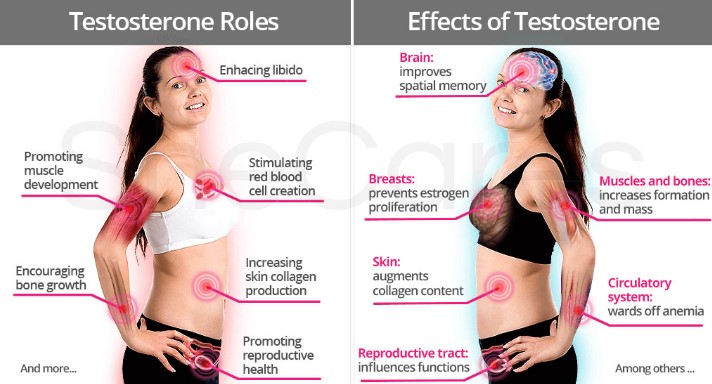Testosterone is often thought of as a male hormone, but women also have small amounts of this sex hormone. Testosterone is responsible for the same health benefits in men as it is in women, such as strength, muscle mass, bone density, mood, and memory. Changes in the levels of hormones made by the ovaries are linked to the period before menopause. Our ovaries make different amounts of progesterone, estrogen, and testosterone. All three of these hormones are important for libido. Testosterone is the main hormone that affects sexual desire, and during perimenopause and menopause, a lot of women find that their libido goes down. There are many proven ways to improve your testosterone levels.
Top five testosterone boosting ingredients
Protein, zinc, magnesium, the B vitamins, particularly B6, and omega-3 essential fatty acids are the most effective vitamins for increasing testosterone levels. Consider putting these top five foods that increase testosterone into your diet on a regular basis:
- Eggs (organic, free-range) are high in protein, vitamin B6, and omega-3 fatty acids. It is safe for the public to eat one egg every day.
- Almonds and pumpkin seeds are both high in zinc, magnesium, and protein. Try to eat one handful of almonds (about 20) and a handful of pumpkin seeds every day.
- Green leafy vegetables, like spinach and kale, which are high in magnesium, vitamin B6, and iron, should be taken in every day.
- Wild oily fish like salmon and mackerel are high in omega-3 fatty acids and protein. You should try to eat at least two to three servings per week.
- Beans, especially black, kidney, and pinto beans, are full of protein, zinc, B vitamins, and magnesium. Legumes are also a great source of protein for vegetarians.
Which supplements and herbal remedies?
Magnesium, zinc, and B vitamins are all good supplements to take, especially if your diet is low in the foods listed above. Magnesium, in particular, works best when taken as magnesium bisglycinate (also called magnesium glycinate, magnesium glycinate, or magnesium chelate).
When it comes to herbal treatments, tribulus (Tribulus terrestris) and ashwagandha (Withania somnifera) are my “go-to” herbs.
- Tribulus: A study with postmenopausal women showed that when they took an extract of Tribulus, their libido and testosterone levels went up a lot. You can drink it as tea or as an extract. Talk to a herbalist about how much to take.
- Ashwagandha: Even though the studies that show ashwagandha can increase testosterone were only done on men, it is thought that this herb has the same effect on women. In any case, this herb has a long history of being used to help girls stay healthy by balancing their hormones, improving their sexual performance, and lowering their stress response. It can be taken as a powder and mixed with cinnamon and almond milk to make a tasty latte. A standardised root extract taken in drugs is a better choice for a healing dose (250-500 mg daily).
- Sustanon 250 is very helpful for women who want to raise their t-levels. If you use it, you can see results right away. If you buy Sustanon 250, you will see good results in your life and in the bedroom.
- Purchasing Testoviron Depot 250 Injection Testoviron Depot is a man-made version of the male sex hormone testosterone, which occurs naturally in men. It is used to treat health problems caused by a lack of testosterone in adult men by giving them more testosterone (male hypogonadism).
Before taking any supplements or natural remedies, you should talk to a qualified doctor, naturopath, or herbalist. This is especially important if you have a medical condition.
Chill out – the hyperlink among stress and testosterone
When stress lasts for a long time, testosterone levels can go down. Why? Both testosterone and cortisol, a hormone that is made in large amounts during long-term stress, are made in the body from the same precursor. Because of this, a high demand for cortisol can hurt the production of testosterone, which is why self-care is so important:
- Every day, you can meditate for 10 minutes in the morning using an app like “Insight Timer.”
- Short breathing exercises, like “Breathing Space” and “Pranayama,” can be done before or during stressful situations.
- Prioritise sleep; if you are suffering, magnesium is likewise a super sleep aid.
- Ashwagandha also helps keep cortisol levels in a healthy range, reduces stress, and promotes sleep.
Stay lively, enjoy a gentle workout, and… sex
- People know that intense, fast-paced exercise raises testosterone, but I’m usually very cautious about recommending it to women who are past menopause. When you work out too much, you put more stress on your adrenal glands, which has a negative effect on testosterone (the adrenal glands have a key role in testosterone production in girls). Moderation is the best!
- Focus on light exercise like brisk walking every day, but don’t forget a class of aerobics, zumba, or walking twice a week if you aren’t pushing too hard (pay attention to your body).
- Mind-body practices like yoga are highly recommended because they are also good for the nervous system and adrenals.
- Sex brings intimacy. Testosterone makes intimacy stronger, but studies show that a healthy intimacy life in which you enjoy sex every day also has a good effect on testosterone.
- Spend time outside to make sure you get enough vitamin D. Studies have shown that vitamin D may also help boost testosterone. Even though the link between vitamin D and testosterone isn’t always completely proven, vitamin D is still important for normal health, especially for women going through menopause or who have gone through menopause.

